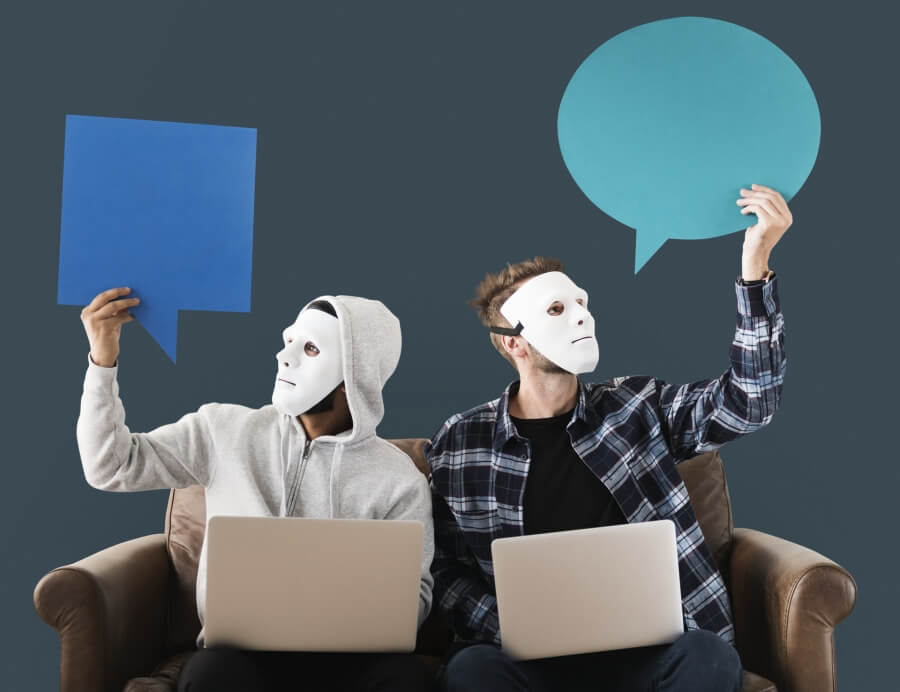How to decide between hate speech and free speech?
The debate between banning hate speech and letting it be is one that’s been plaguing technology companies since long. If you ban hate speech, you are curbing the right of people to free speech. If you don’t ban it, you are becoming complicit in the behaviors that are a direct action of hate speech. These, along with other questions, are what keep brands divided on the issue of hate speech.
Hate speech which often includes racist slurs and comments on everything from body shaming to anti-semitism, is allowed under the basic freedoms that are afforded to Americans. Since hate speech is not something that is banned by the law, it falls upon platforms to decide whether they want to ban it or not.
One problem that lies at the helm of this debate is that it is extremely difficult to define what qualifies as hate speech and what falls into the indefinitely free category of freedom of expression/speech. When words being directed to one person count as hate speech but to the one directing those words, it counts as free speech, the decision gets tricky. If you are defending someone from hate speech, you are effectively taking away another person’s right to free speech.
Does Censorship do more harm than good?
While the solution sounds as simple as platforms taking a side and banning free speech, history is a testament to the fact that censorship has never worked in anyone’s favor. Banning hate speech is a form of censorship that might damage the company in the long run.
One popular study that shows how censorship often backfires is The Streisand Effect According to this study, when Barbra Streisand tried to prohibit people from taking pictures of her Malibu mansion citing privacy concerns, the decision immediately backfired on her. The publicity generated by the case generated intense curiosity around the mansion which resulted in pictures of her mansion being download 420,000 times a month. Likewise, another study “You Can’t Stay Here: The Efficacy of Reddit’s 2015 Ban Examined Through Hate Speech” examined how users moved on from Reddit towards other platforms after hate speech was banned.
Another example of censorship going wrong is when the United Kingdom put a heavy blanket censorship on the internet in 2011 due to increased political unrest around the world. The censorship was meant to curb violence and uprising but it actually increased the number of such incidents.
Protecting the right to free speech
While banning hate speech is an important issue that needs to be addressed, so is the issue of free speech. People all over the world are struggling for the freedom of free speech, battling regimes that function under censorship. In this world, America has always prided itself on giving all citizens equal rights to free speech. Unfortunately, the same thing that America prides itself on often becomes problematic for the country. Protection of free speech also means protection of the hate spewed by the Ku Klux Klan, protection of people who think the Sandy Hook shooting was a conspiracy to ban guns and protection of all the racial slurs used against people of different races and ethnicities.
People viewing the internet as a safe space
For most people, the internet is an escape from the real world. It’s a place where they can reinvent themselves and put out their feelings into a safe space. When platforms do not regulate themselves and allow all kinds of content to be posted without any consequences, people stop viewing the internet as a safe space. Most people want the social media platforms they use to be free of bullying, discrimination and hate speech.
Another argument is that instead of banning hate speech, people who propagate this kind of speech should be banned instead. However, the issue still remains: if you ban one troll. ten other trolls will pop up in its place instead.
With so many arguments against and in favor of curbing free speech, we are still at the crossroads where we were before. Whether banning free speech will make the internet a safer place or will it create more problems? Till technology platforms find a suitable way eliminate or regulate hate speech on their platforms, the only thing they can do to protect their users is to give them options that let them control their experience as much as possible. By giving users the options for blocking, muting and filtering, these companies can make sure that users can keep themselves away from content that they do not like.
How Difficult Is It To Moderate Speech on Social Media?
As I discussed in my previous blog about Reddit and its CEO, asking tech companies to moderate speech to comb out and combat hate speech can be an impossible task. Hate speech can only be tracked by human moderators because, as speech is evolving day by day and new slurs are coined, artificial intelligence alone cannot be as useful in tracking hate speech even if trigger keywords are identified.
Even though Facebook is looking for artificial intelligence that can help them combat the issue of free speech, this mechanism might still have a lot of time to go before it becomes fully operational. While many social media websites do have a strict system in place around people threatening each other or using violent speech and the sharing of non-consensual pornography, they do not take actions against individuals if and when they are found using hate speech.
Can Brands Use Hate Speech to Their Advantage?
Not only does the internet have all kinds of diverse users, they are also smart and like to question what is put in front of them. As easy as it is to get them talking about something and making it viral, they can be equally critical and, sometime even hateful, of what pops up on their screen if they hold a differing stance or opinion about it. According to MindSight, 42% of customers learn about products and services through Twitter alone, meaning a few majorly negative Tweets could provide the wrong first impression for many potential customers. Even one negative Tweet can have a devastating impact on your brand.
Marketing involves putting out your product in front of the whole world through the world wide web. Even though the last few years have been all about targeting and specifying audiences which gives you some control over who your content should reach based on demographics and other details, it does not give you much control over who will not see your content. To learn more about how extending your content reach, reading this blog by PNC, a company known for its SEO services in Orlando can help you. People tend to share the content that they like or hate; I come across a promotion posted by an agency on my timeline, for example, because my details matched the kind of audience the agency was targeting. I like the content and share it on my private timeline, and from there onwards the kinds of audiences the content will be exposed to is limitless.
As a brand, negative feedback can work as a blessing in disguise for you; Remember, negative publicity is also publicity, as it will translate to better engagement even if you receive lot of criticism from the audience. It can alert you to potential problems with your products or services, it can also help you gain better insight into consumer behavior and tell you if and where your customer service needs improvement.
Know What to Respond, What to Ignore and What to Take in Private
Coming across blatantly derogatory statements in the form of reviews is not uncommon for brands. Your Social Media Team or Manager’s first impulse should naturally be of countering such hate with the same or similar kind of words. In fact, the followers of your brand may respond on your company’s behalf, but you, as a brand, need to identify the kind of comments that are better ignored, as some online wars are begun to never end.
If you choose to respond, on the other hand, it might take a lot of your time to answer to their queries about your product or service, but it will also get you stronger critique which, if you allow and deal with wisely, will help you improve your brand. Answering back will also give you an opportunity to market your product or service better by mentioning its additional features. Such an audience is also easy and better to experiment with, as quicker results are generated when people are quick to react to what you post.
It will help your fans and followers see how maturely you respond to negativity, which can lead them to think more highly of your business and can lead to trust, loyalty and returning customers in the long run.
Some interactions will need to be taken in private, as not all interactions with your audience will be remarkable examples of your customer service. If you are unable to satisfy the customer, or if the customer is starting out angry, take the conversation private, for often the ego factor dies down a little when the whole world isn’t reading your comments and it becomes easier to understand the other side’s point of view. Who knows, they might actually end up liking you!






















Leave a Reply